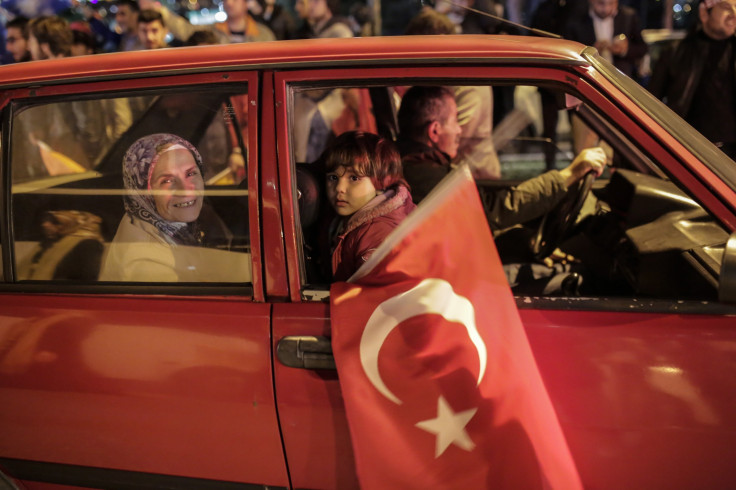Turkish President Erdogan's Majority Win In Snap Election Results Sparks Fear Among Kurds And Turks

BEIRUT -- Mary, a young Turkish writer from Istanbul, had high hopes that Sunday’s parliamentary elections in Turkey would follow on from June’s election when Turkish President Recep Tayyip Erdogan’s political party failed to win a majority. The 24-year-old, who preferred not to give her full name once the election results were revealed, citing threats to her security, was overjoyed at the prospect Turkey would finally start addressing long-neglected human rights and minority issues.
But her excitement was short-lived. As she watched the results come in from Sunday’s snap election, indicating Erdogan had won outright, Mary’s main feeling was one of fear.
“I was not expecting this outcome at all,” Mary said. “I’m very scared about how things are going to continue.”
After winning a majority -- at 49.4 percent of the vote compared to 25.4 percent for the main opposition party, Republican People’s Party (CHP) -- Erdogan's Justice and Development Party (AKP) is no longer required to form a coalition government. The majority win for AKP will yield 316 seats in Parliament, well over the 276 seats required to consolidate government and run the country on its own.
Prime Minister Ahmet Davutoglu said the election results were a "victory for our democracy and our people.” But many were surprised by the results. Sunday’s election was the second of its kind in just five months, a symptom of an increasingly fragmented political system in the country with a worsening security situation, and an electorate increasingly skeptical of the government’s, and Erdogan’s, intentions.
“Turks are telling me they’re so disappointed. They’re living in a corrupt country,” said David Phillips, director of Columbia University’s Program on Peace-Building and Rights, and senior adviser to the State Department for the past three administrations.
The financial markets were equally surprised by the AKP’s majority win. For the last year, Turkey’s economy had been feeling the effects of the country’s increasingly unstable security situation and the Turkish lira had dropped 20 percent, according to the International Monetary Fund. Just hours after election results were announced, the lira jumped nearly 3 percent, the strongest it has been since mid-August.
Sunday’s win for AKP also allowed Erdogan to edge out some of the pro-Kurdish parties that had prevented him from winning a majority in June. The pro-Kurdish Peoples’ Democratic Party’s (HDP) political party won 10.4 percent of the votes, enough to get 59 seats in Parliament, 21 seats fewer than they won in June.
Before the June elections, Erdogan announced if AKP won a majority, he would hold a referendum to construct a constitution that would give the president new executive powers. Some have interpreted this announcement as the words of an autocrat trying to consolidate his power and further curtail freedom of speech and other human rights.
“I’m scared for my future as a writer,” Mary told International Business Times.
AKP did not win the required number of seats to call for a constitutional referendum, but Phillips is adamant the majority win will still award Erdogan with the gains he seeks.
“He doesn’t care about the constitution,” Phillips said. “Nothing is going to change. Violence will continue.”
Since the last election, Turkey’s security situation has become significantly more unstable. The country has become increasingly embroiled in the Syrian civil war next door. It has taken in more than 2 million refugees and its borders have becoming a revolving door for foreign jihadists hoping to join the Islamic State and other militant groups.
The conflict has now spilled over into Turkey where ISIS has been blamed for at least three separate bombings since July.
“It’s gotten so bad this year. Hate crimes have increased so much, it's scariest to be Kurdish,” said Mary, who is not Kurdish, but whose politics make her sympathetic to their cause.
Initially, Turkey claimed its recent involvement in conflicts in Syria and Iraq were to support the United States-led fight against the group also known as ISIS. But in October, Erdogan admitted Turkey’s actions were mainly to prevent the Syrian Kurds, a significant U.S. ally on the ground, from claiming territory on its border and joining forces with its Turkish counterpart.
“Turkey doesn't need permission from anyone -- we will do what is necessary,” Erdogan said last week.
After the June election, the Turkish government also began to severely crack down on its own Kurdish population, which constitutes roughly a fifth of Turkey’s population. Turkish nationalists have been fighting the Kurdistan Workers’ Party (PKK), an armed Kurdish group listed on the U.S. State Department’s list of designated foreign terrorist organizations, for decades until a ceasefire was negotiated in 2013.
In July, the 2013 ceasefire between the Turkish nationalist government and Kurdish militias broke down, and the result has been some of the worst internal strife the country has seen in years. In October, two bombs exploded in the country’s capital, Ankara, killing 102 people, making it the deadliest attack in Turkey’s recent history.
After the election results were announced Sunday, clashes erupted between Turkish security forces and Kurdish protesters in Diyarbakır, a Kurdish majority city in southern Turkey and at least one bomb went off in Nusaybin, a separate Kurdish city also in the south.
When asked if the worsening security situation would force her to leave her hometown, Mary was torn. She loves Istanbul but recognized the importance of establishing ties to another country “just in case” she needed to leave.
“I know it's much worse in other countries, so I can't complain too much,” Mary said. “I just feel like we're lobsters and they're [the government] slowly simmering the water under us. And we won't even know by the time we're boiling.”
© Copyright IBTimes 2024. All rights reserved.





















